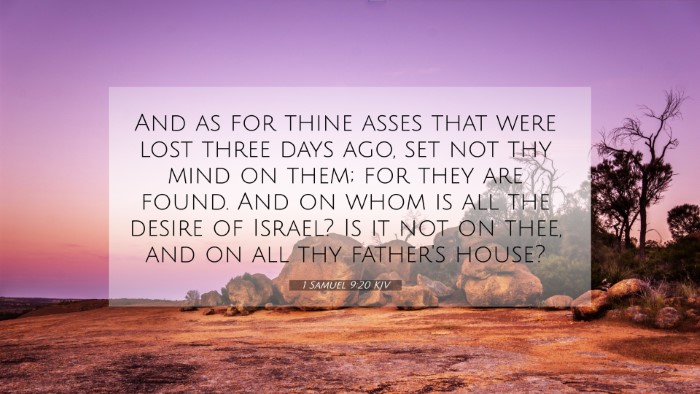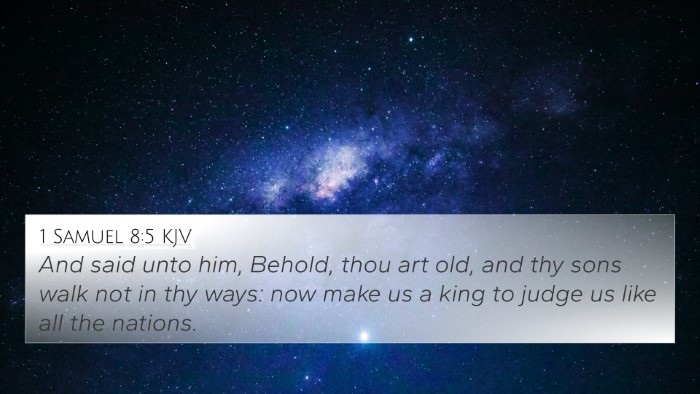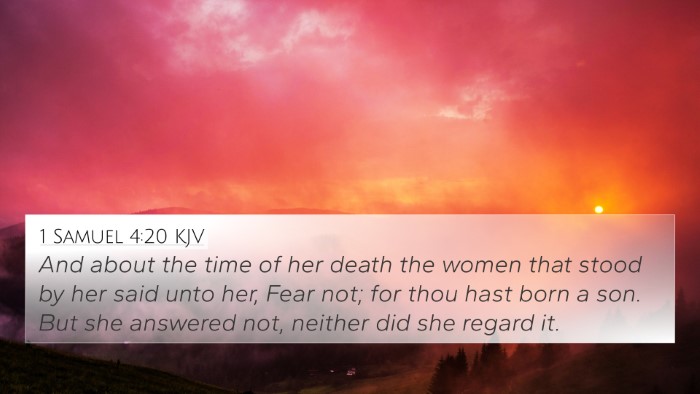Exploring the Meaning of 1 Samuel 9:20
Verse Context: 1 Samuel 9:20 states, "And as for your asses that were lost three days ago, set not your mind on them; for they are found. And on whom is all the desire of Israel? Is it not on you, and on all your father’s house?" This verse occurs during the narrative where Saul is chosen to be the first king of Israel, emphasizing the divine choice of leadership and the unfolding plan of God for His people.
Summary and Interpretations
Commentaries by Matthew Henry, Albert Barnes, and Adam Clarke provide rich insights into this verse. The verse underscores the transition of focus from a mundane concern (the lost asses) to the providential fact that Saul, the soon-to-be king, embodies the hopes and desires of Israel.
- Matthew Henry:
Henry interprets this verse as a pivotal moment that introduces Saul's kingship. He explains that although Saul was preoccupied with searching for his father's lost donkeys, a greater purpose was at hand, which would ultimately elevate him from an ordinary existence to a divine appointment.
- Albert Barnes:
Barnes emphasizes the shift in perspective in this verse. He notes that the ass's recovery symbolizes a lesser concern, highlighting that God's plans often surpass our immediate worries. He points out the reluctance of Saul in accepting his role, despite being chosen to fulfill Israel's aspirations.
- Adam Clarke:
Clarke adds a historical layer by indicating that the loss of the donkeys led Saul to the prophet Samuel, further illustrating that God works through our everyday dilemmas to lead us to a higher purpose. He also connects Saul’s narrative to Israel’s desire for a king, redirecting their focus from the lost animals to the divine choice before them.
Cross-References and Thematic Connections
This verse can be connected with several other scriptures that illuminate its themes of divine providence and leadership roles:
- Deuteronomy 17:15: Moses instructs the Israelites to choose a king whom God will appoint, emphasizing the importance of divine selection in leadership.
- 1 Samuel 10:1: This discusses the anointing of Saul by Samuel, showing the fulfillment of the prophecy initiated in 9:20.
- 1 Samuel 8:5: The Israelites' demand for a king underscores their desire for human leadership, setting the stage for the events in chapter 9.
- Psalm 78:70-72: Reflects on God’s selection of David, relating to God’s choice of leaders in Israel and His sovereign control.
- Acts 13:21: Mentions Saul's kingship in relation to God’s plans through the lineage of Israel, showing the historical significance of Saul's role.
- 1 Samuel 16:1: This verse depicts God’s rejection of Saul at a later time, revealing the conditional nature of divine choice based on obedience.
- Jeremiah 3:15: God speaking to Israel about appointing shepherds reflects the ongoing theme of God providing leaders, both good and poor.
Thematic Bible Verses and Parallels
Similar themes of God's providence and the destiny of leaders can be found throughout the Bible:
- Isaiah 55:8-9: God's thoughts and ways are higher than ours, paralleling the divine plan in Saul's selection.
- Romans 13:1: Encourages believers to recognize that all authority comes from God, reinforcing the theme of divine authority seen in 1 Samuel 9:20.
- Philippians 4:6-7: Advises against worry, echoing Saul’s initial concern over the lost donkeys, teaching faith in God’s overarching plan.
Conclusion
The verse 1 Samuel 9:20 serves as a profound reminder that God often uses ordinary circumstances to lead us to significant outcomes. It illustrates the beginning of Saul's journey as the king, emphasizing that God is intimately involved in the details of our lives, directing us towards His greater purposes. In studying this passage, we see the importance of understanding Biblical context and interconnections, allowing for deeper insights into God’s word.
For those seeking to understand how this verse relates to others, utilizing tools for Bible cross-referencing like concordances and thematic studies can greatly enhance comprehension. By analyzing these interactions, we can cultivate a more comprehensive understanding of the Scriptures.











